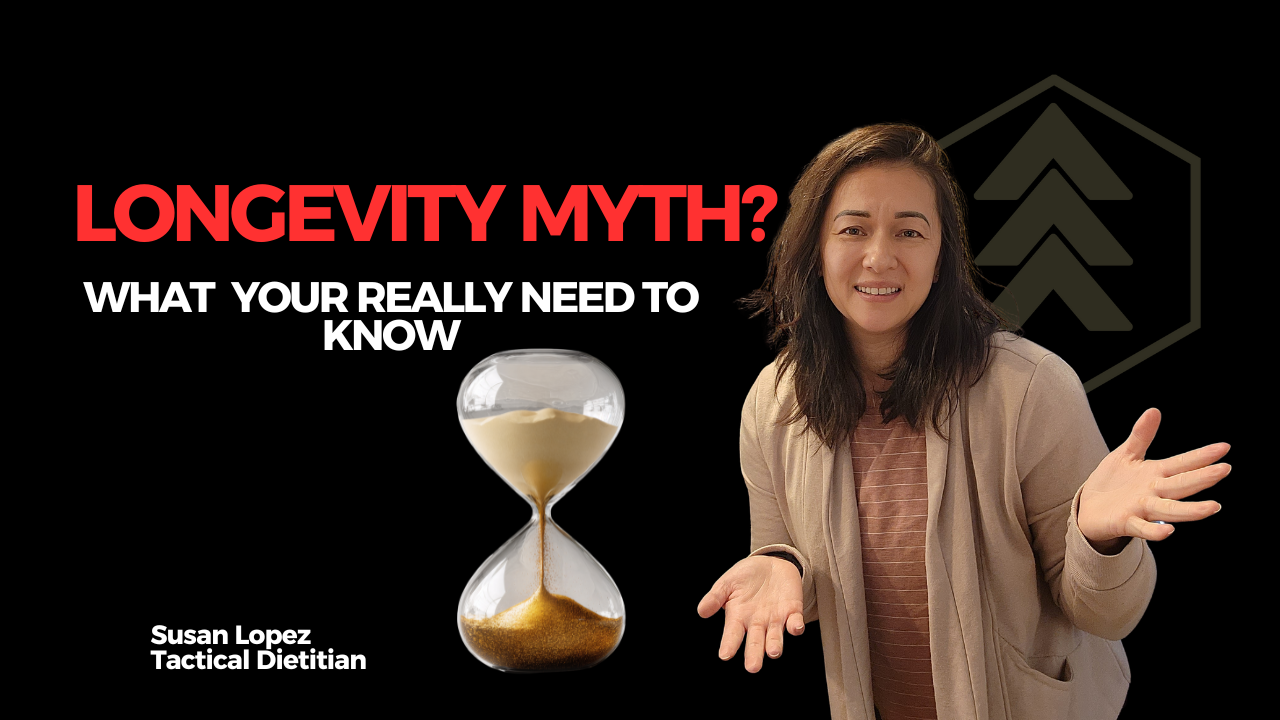Longevity vs Healthspan: What Really Matters?
Sep 03, 2025
Can we actually improve our longevity?
Longevity is the hottest topic in health right now. Everywhere you look, someone is talking about how to increase it. But what does longevity actually mean, is it something we can truly chase, and is it even worth it?
Longevity simply describes life expectancy, the length of time you will live. It is being marketed everywhere. Even I talk about it. The question you need to ask is what are they trying to sell you. Most of the time the answer is supplements.
I like supplements, but let’s be clear. There is no supplement that will extend your life expectancy. Your biological clock was set before you were even born. What your grandparents likely did with their lives will impact how you and possibly even your children when it comes to life expectancy.
So then why bother?
Because what you do with your life can speed up your death or help you live better until the end. The quality of those years is what matters. That is healthspan. It is the difference between being alive and being able to live.
The concept of health span has been around for a long time, but it has been glamorized in recent years by Gabrielle Lyon, Peter Attia, Andrew Huberman, and others. All great resources but there are plenty of other resources worth reading:
- Good Energy by Casey Means
- Age Later by Dr Nir Barzilai
- Successful Aging by Daniel Levitin all provide valuable insights.
And for those of you who like to say “who wants to live forever,” the truth is you do.
Anyone who has made it past the age of 35, myself included, starts to feel their own mortality creep in. That is why you are here reading this.
So how do we measure longevity and what habits actually make a difference in outcomes, especially for LEOs, firefighters, and first responders who face higher stress, unpredictable schedules, and dangerous environments?
Determinants of Longevity That YOU can Control
Markers of chronic disease and inflammation. Lipids, blood sugar, and insulin all matter. HDL cholesterol in particular has been identified as a key metric in centenarians (Age Later). Elevated LDL cholesterol and chronic inflammation shorten both lifespan and health span. Learn more about inflammation in our previous post.
Blood Pressure
Life expectancy for men in their fifties (50s) decreases by an average of five (5) years if blood pressure is high. For women it is three (3) years. This is critical for individuals who already face higher cardiovascular risk.
Checking once a year (or even less frequently) at your doctors office is not enough, and is likely to be inaccurate. Checking at home, under the right conditions, often leads to more accurate results and insight into what's really happening with your blood pressure. Want to learn how to check your blood pressure accurately at home? Check out this article we posted HERE.
Skeletal muscle mass
The risk of sarcopenia, or age-related loss of muscle, is real. Losing muscle means losing independence. Strength training protects you as you age. For firefighters and first responders, maintaining muscle is not just about performance but survival in the field.
You need to weight train. Period. 2 to 3 times a week get in the training room and lift. Nutrition will also play a significant role in maintaining lean muscle mass. We are simultaneously breaking down lean muscle as we rebuild lean muscle. Without an adequate supply of calories and protein to rebuild lean tissue we rebuild what's broken down.
VO2 Max
There are conflicting opinions about how to use VO2 as a metric, but it is worth checking. Think of it like cholesterol or blood pressure. It provides a snapshot of where you are relative to where you should be and helps track your trajectory over time.
VO2 declines with age and it is associated with life expectancy. The goal is not to chase VO2 numbers but to maintain or improve cardiorespiratory fitness with consistent cardiovascular training. Annual VO2 testing can help you track changes and adjust training.
You can book your VO2 and Biological Age testing at The Lab with Tactical Dietitian. Book your VO2 test HERE.
What actually works to improve healthspan
The truth is you will not see immediate returns on the things that extend your life. It is a long game. There is nothing you can take that will make a meaningful difference, but the good news is most of the things that matter are not expensive. Unless you want to be like the Bryan Johnsons of the world, who spends millions of dollars on his health but still does not eat real food, you can take simple, proven steps. And I'm not talking about the Liver King, Brian Johnson.
Take these steps:
- Annual lab testing and VO2 testing. Stay proactive by tracking your numbers. Download the Cholesterol Guide for a list of labs worth running.
- Check your blood pressure at home and track trends.
- Lift weights and hit your protein goals to protect muscle.
- Aim for at least 30 minutes of moderate cardiovascular exercise 5 times a week (~150 minutes)*. Zone 2 training is highly effective for improving most peoples cardiorespiratory fitness.
The moral of the story is that if you want to live longer, you have to do the unsexy work. There is no shortcut. Longevity is built on daily habits and consistency, not gimmicks.
*edited 11Sept2025. I said 30 minutes a week - it's supposed to be 150 minutes a week or 30 minutes 5 days a week.